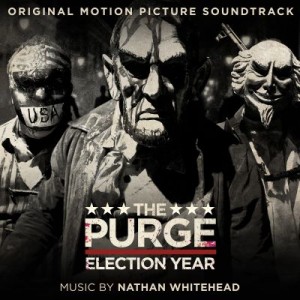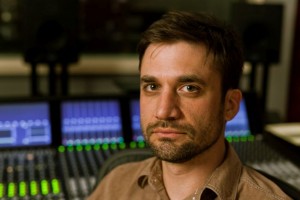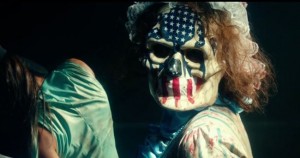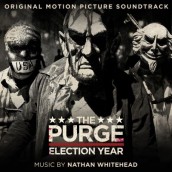
THE PURGE ELECTION YEAR soundtrack | ©2016 Back Lot Music
The past few years have been a field day for dark, rhythm-driven suspense scores. But when many of these pulsating killing fields have a tendency to merge into one big murder dome, how does one keep the mayhem playing with a sense of fresh musical blood? Just ask Nathan Whitehead, a composer who’s consistently been playing his brutally cool way of surviving one Purge after the other with his action-horror identity intact. In creating what’s easily the most interesting Blumhouse franchise (or at least until they turn WHIPLASH into one), director-writer James DeMonaco took the idea of Classic Trek’s “Red Hour” from a Landru-approved festival of carnage into a far more believable U.S. government’s sanctioning of an anything-goes, yearly night of mayhem.
A sinisterly clever metaphor about violence that’s had it’s chainsaw-shotgun-machete cake and eaten it too, the PURGE series has successively grown in its ambitions, going from home invasion to city-wide freak-out, and now most cannily with an “Election Year” that’s just slightly less terrifying than the real one. Back in action from ANARCHY is ex-cop Barnes (Frank Grillo), who didn’t succumb to his legal lust for revenge against his family’s inadvertent killer. Now rewarded with providing the security for a Senator (Elizabeth Mitchell) who wants to put the moral kibosh on The Purge, Barnes is forced into a Die Hard-esque scenario as the official’s adversaries use the Purge as a way to wipe out any hope of ending the insanity. Needless to say, our hero will get to exercise his kill-or-be-killed rights across Washington as he tries to protect his boss from one twisted slice after the next.
All along the way of its Washington murder zones, Nathan Whitehead enables both berserker rage and food for thought with his ever-ambitious scores. Combining industrial rock worthy of foot-long nails with dread-inducing atmospheres and twisted samples for his first two Purges, Whitehead’s scope of destruction is both more heartfelt and brain bashing with ELECTION YEAR. His music continues to impress as it breaks out melodic emotion, then runs like hell from shredding electric guitars, fear-sensing sonar and howling voices. It’s a score that plunges the listener into humanity gone mad, assaulting them with a method to its madness.
Uniquely equipped to combine music with audio design with his copious credits in both fields for games, films and television (among them sound editing on SAINTS ROW, CRANK and PRIDE AND GLORY, Whitehead’s musical upbringing has had no shortage of rhythmic adrenalin in his collaborations with Steve Jablonsky on TRANSFORMERS: DARK SIDE OF THE MOON and KEANU, or coordinating the music of button-pushers INFAMOUS, BIOSHOCK 2 and RATCHET & CLANK. Where Whitehead’s taste for adrenalin has fueled such scores as THE LAST SHIP, 12 ROUNDS 3 and BY THE GUN, it’s his ability to let it all loose for those precious twelve hours that truly allows him to inventively rage, especially on an ELECTION NIGHT where fans of blasting, terrifying action are the winners no matter the party of choice – a run for his life that Whitehead revels in like never before.

PURGE composer Nathan Whitehead | ©2016 Nathan Whitehead
ASSIGNMENT X: Could you tell us about your musical upbringing?
NATHAN WHITEHEAD: My upbringing could be summed up by experimentation. I grew up listening to my parents’ records and playing the family piano. I didn’t take piano lessons but I was obsessed with picking out tunes I had heard and writing little riffs. We weren’t a family of musicians but music was always playing in the house and in the car – mostly rock & country from the 60s and 70s. For better or worse, I’ve generally been determined to explore things in my own way and music was no different. I think it usually made me a bad student but I would go all-in on the things that seemed interesting generally at the expense of everything else. Around age eight or nine I became intensely curious about music and how it made me feel. The idea of writing music seemed so amazing. At some point around that time we got a Casio SK-1 for Christmas and that was a whole new world. It had a crude sampler and a brass ensemble patch that I loved. I picked up guitar a couple years later. In high school I formed a punk band called Spork and started writing tons of songs. That was a really exciting time for me musically and I was becoming interested in writing different genres, not just punk songs. I was focused on music by the time college came around but I didn’t know I would end up in film scoring. I studied music and studio production at MTSU in Tennessee before moving to L.A. I also took a few film scoring classes at UCLA but only until I started finding composer assistant work. Those jobs generally demanded pretty intense hours, but that is the best education in film scoring you can get.
AX: You started out as a sound editor at the same time you began working as a composers. What did working in one field teach you about the other?
WHITEHEAD: There is a lot of overlap in thinking between the two. I was always writing music but sound editing was where I managed to get a job when I moved to L.A. I was very fortunate to work for Dane Davis at the time and that job really taught me a lot about storytelling. Dane is also a musician and I think he approaches the sound design in a film in a similar way you might approach writing the score. I learned the importance of focusing on storytelling above all else and I also started to really think about the emotional content in sounds and textures. There are emotional statements being made by the notes on the page but I think there can be an emotional connection present in a lot of sounds that are more difficult to put on the page. The page is sort of a crude approximation of what we hear. We have such an established history of how musicians interpret those notes that it’s easy to take for granted all the things that make up what we are hearing—the note, the instrument, the mood the musician is in, the physics involved. Working in sound editorial helped broaden my idea of what an instrument can be and it really reinforced that I am striving to tell a story and make an emotional connection and there are no hard and fast rules on how to achieve that. This job also really beefed up my studio and tech chops and that came in handy later when I was assisting various composers around town.
AX: How did you first become a part of THE PURGE series?
WHITEHEAD: I wound up on The Purge ultimately through a composer friend of mine, Steve Jablonksy. Steve was a wonderful mentor to me and we’ve continued to work together over years. He introduced me to Platinum Dunes, which was one of the production companies involved (the other being Blumhouse). Obviously at the time nobody dreamed that this would launch a franchise. It was just a small movie that needed someone to write a score in about three weeks. I sent them a demo and got the call a few days later. I freaked out when I heard the schedule but then I basically moved into my studio for a few weeks and managed to get it done.
AX: Were you glad to see THE PURGE go outside of the house for ANARCHY? And how did you want to open the score up for an urban setting?
WHITEHEAD: Absolutely! It has been really exciting watching the scope of this story grow with each film. For ANARCHY, the urban setting brought many more layers. Trying to survive in the middle of a city on Purge night is totally different from barricading yourself in your house. I thought the score needed something that propelled us as we move around the city and the score also needed to speak to this odd group of people whose stories intersect as the night progresses. We see the mayhem of the night unfolding in a much larger way and we also see Leo’s internal struggle. We see people connecting in spite of this crazy institution. I think this called for much more range in the score. It was a fun challenge.
AX: With ELECTION YEAR, the PURGE series takes on its biggest canvas yet that brings the series’ political subtext to the fore. What effect does that have on the score?
WHITEHEAD: I think more than ever we are juggling multiple points of view and it makes striking the right musical tone much trickier. We are moving beyond simply surviving Purge night and now examining society and where the Purge fits in and all the different motivations people have. To some the Purge is a very positive thing. In their minds it improves society and it is a right granted by the government. The other side of the aisle firmly opposes the Purge. Some people just make money from the Purge. We have this patriotic celebration and this grisly ritual and somehow the music needed to weave through these different points of view.

THE PURGE ELECTION YEAR | ©2016 Universal Pictures
AX: How do you think the score shows how Sergeant Barnes has grown as a character since deciding not to become a killer at the end of ANARCHY? And how does star Frank Grillo’s charisma fit into your score?
WHITEHEAD: I think there’s a restraint and precision to Leo that I tried to incorporate into the score and I think that highlights a bit of his journey. He is now working within the system in America. Rather than grab quick vengeance on Purge night he has decided to embrace democracy to peacefully and thoughtfully be an agent for change. At least that’s the goal. He’s now playing the long game. To me, Leo has this measured toughness that I tried to reflect in the music. He is resolute in his mission but he’s taken much of his emotional reaction out of it and I wanted to feel that drive in the score. Frank’s charisma is a big part of that. I think he embodies Leo in a very genuine way. He has this hard edge and he can be mysterious but he’s also a good guy and he is cool. I tried to have all that come out in the score. Leo’s music always needed to be cool.
AX: Do you think there’s more of an emotional component to the score in terms of how you balance an orchestra with rhythmic samples and rock guitar energy?
WHITEHEAD: I do. I think the emotional component has grown more significant and more complex with each movie. I think we get more into the hope of the American people this time around. People are being galvanized and the score needed to support this larger shift in how the country as a whole feels. There are also patriotic & passionate purge supporters where we have this strange mix of a beloved tradition and brutal murder all wrapped up in one. There are also more intimate moments. It just feels like a bigger story overall.
AX: The action in ELECTION YEAR is fiercer than ever. How hard rock / heavy metal did you want to make the violent insanity?
WHITEHEAD: I wanted to be aggressive and hopefully communicate the nightmarish madness of the night, but I didn’t want to go too hard rock or metal. The score definitely has its moments where it’s sort of retro and we have some big, nasty guitars. That was fun and I think it works in the scene but James was always steering me away from focusing on one genre too specifically.
AX: One instrument you might not expect to hear in a PURGE score is an organ. What gave you that idea?
WHITEHEAD: I think the initial idea came from either James or our editor Todd Miller. We were trying to find something that felt right for those who passionately believe in the Purge. The organ has a ceremonial / religious quality that seemed to work really well in this perverse way.
AX: How difficult is it to walk the PURGE series’ tightrope between harshness and melody – let alone create a score that works for both action and horror?
WHITEHEAD: We talked about this a lot on every film. I think this is the hardest part about writing music for The Purge. The film straddles all these genres. Anytime we went down a path musically that was too genre-specific it didn’t work. Finding the balance is the hardest thing but it’s also one of the aspects that make it so much fun to work on. Hopefully, it’s a good mix. I didn’t want to be so harsh that the audience is just pummeled for two hours but when things get ugly, we wanted it to get really ugly.
AX: Given how popular dark percussive scores have gotten, what kind of sampling did you use to give your own approach its identity? There are bits of it that strikingly sound like submarine sonar, while other stylistic touches could be mistaken for hissing snakes.
WHITEHEAD: I try to create a custom vocabulary for each movie as much as possible. Recording lots of weird sounds and turning them into sampler instruments is something I love and it’s a big part of how I work. It’s not a new concept – plenty of composers do that – but by setting out on each project and building this specific sonic world I think the score can have more of a unique identity. I think this is a good example of my past sound editor life being useful and it really highlights how a simple sound can have a specific emotional quality. It’s a subjective thing but I try to find and create sounds that evoke the world of the Purge to me. Eventually this grows into the body of sounds and motifs that make up the score. James is also very tuned into specific sounds. The “sonar” element you mentioned is one that caught his ear and we brought back in a few places. That sound is actually my ancient SK-1 keyboard (not the same one I got as a kid but the identical model I found on eBay) ran through various guitar pedals and plug-ins. For me, the key is to try not to be limited by off-the-shelf sounds but try to imagine what this world sounds like and then experiment until those sounds and motifs emerge.
AX: Vocals almost make a particularly scary impact on the ELECTION YEAR score. How did you want to use them?
WHITEHEAD: I thought vocals were particularly helpful in shoring up the haunting and nightmarish nature of the Purge. We see some very dark recesses of society in this story. We talked a lot about ‘descending into the nightmare.’ To me, some of the vocal elements helped depict the sickening nightmare.
AX: Your writer-director James DeMonaco has essentially made his whole career within the world of THE PURGE. How do you think he keeps the series fresh, especially when it comes to your collaboration?
WHITEHEAD: I love working with James. I’m not sure how he thinks of these things but it is inspiring to see the way he pours himself into each of his movies. I think he has a wonderful imagination that is apparent in the crazy ways the Purge world is expanding. I think our collaboration process is largely the same. He really gives me a lot of space to try ideas and creates an environment where it’s safe to be vulnerable and experiment to see which idea works. That is so important. I think it allows good ideas to surface. I think he keeps it fresh by continuing to take the story in new directions that call for different musical approaches each time.
AX: Do you think there’s a Blumhouse “brand” that THEPURGE fits into? And given how abstract many of their scores get, do you think it gives you even more freedom to truly go nuts here?

THE PURGE ELECTION YEAR | ©2016 Universal Pictures
WHITEHEAD: I don’t really think there’s a “Blumhouse” brand that shapes the movie. If anything, their brand is diversity. A wonderful thing about Blumhouse is they create an environment where it seems like directors get to make the movie they want to make. Most people know Blumhouse focuses on smaller budgets but every movie, from a student short to a $100M tentpole, has to work within budgets, schedules etc. Their relationship with directors has a big positive affect on how James and I get to work together. There is freedom to go nuts. This is a collaborative job and by allowing directors’ creative vision to guide the process it makes the work so much more satisfying.
AX: You recently did quite a serious score with Steve for KEANU. Was it difficult keeping a musical straight face when hunting for a cute kitten in the hood with Key and Peele?
WHITEHEAD: Keeping the music fairly serious seemed like the way to go right from the beginning. Steve and I are both huge fans of Key & Peele and of the director Peter Atencio. Using serious, cinematic music is something that Peter has done brilliantly in so many Key & Peele sketches. Plus, Peter creates these amazing, cinematic sequences. Just looking at individual shots you would never guess that the movie was a comedy – at least until the kitten shows up. So we sort of knew at the outset that we didn’t want a typical comedy score.
AX: Having done a lot of work on such videogames as INFAMOUS, RATCHET & CLANK and GEARS OF WAR 3, what would you say is the biggest difference between scoring for film and television? And is there a realm you prefer?
One of the biggest differences is the project timelines. Video games take a long time to develop and it’s not uncommon to be on a project for a year or more. It’s rare that I’m on a movie for that long and TV is generally a brutally fast schedule. Another significant difference is obviously the interactive nature of games. You have to write music that is adaptable to different gameplay scenarios and that can evolve dynamically. One thing I love about my job is getting to change things up from project to project. I love experimenting with new instruments and genres and trying to learn something new on each project. So I like to have a mix of film, TV and video game work. I think the variety makes me continually push myself and they can all be fun!
AX: You’ll be reteaming with PURGE star Frank Grillo when he takes on the aliens of the sequel BEYOND SKYLINE. What’s like to join that series about anarchic aliens?
WHITEHEAD: I feel like I’m Frank Grillo’s personal composer! I’m having a lot of fun on ‘Beyond Skyline’. The director Liam O’Donnell has expanded significantly on the first film. I’m not sure how much I can say but the film is much bigger. I think writing music for aliens is a unique opportunity to stretch the musical palette further and use sounds and weird recordings in new ways. It’s also been interesting because the aliens don’t speak any human languages that we know of but there is alien-human communication. Dialog doesn’t work in the same way and I think that forces us to use music in different ways.
AX: You’ve got quite an interesting score coming up with KILLING HASSELHOFF, where you’ll be trying to murder the star of “Baywatch.” What can we expect from your score?
WHITEHEAD: This is a crazy, hilarious movie! It was a blast to write music for and it was also fun to work in comedy after so many dark and serious projects. It was a great opportunity to write some over-the-top comedy music and dabble in a lot of different genres. The score is all over the place and so is the movie. In a good way!
AX: Where can you see the PURGE series going in terms of its stories, and score?
WHITEHEAD: We’ll I am always surprised by the mind of James DeMonaco so who knows where this can go. I think this story can really continue to escalate. I could see another American civil war at some point with so much contention surrounding the Purge. I think the NFFA and the anti-purge citizens will continue to clash on a larger scale. Maybe the Purge goes global? It feels a bit like a pressure cooker and I think the score will need to scale up accordingly. Who knows what that will sound like musically but it would be a good challenge.
AX: If given one night to purge yourself without any consequences, what can you imagine doing?
WHITEHEAD: I would hastily build an un-permitted garage at my house.
Journey through Nathan Whitehead’s “Purges” from home invasion HERE to city-wide “Anarchy” HERE and an “Election Year” vote for mayhem HERE
Visit Nathan Whitehead’s home page HERE
Follow us on Twitter at ASSIGNMENT X
Like us on Facebook at ASSIGNMENT X
Article Source: Assignment X
Article: Interview: THE PURGE: ELECTION YEAR composer Nathan Whitehead
Related Posts:











